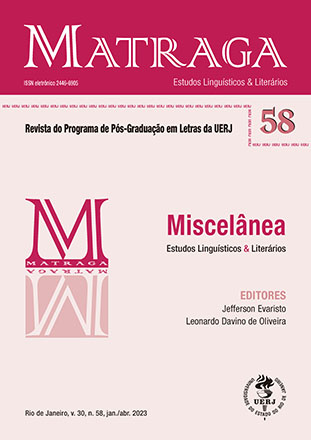Tortura e eletricidade na ditadura militar: uma perspectiva ambiental
DOI:
https://doi.org/10.12957/matraga.2023.72421Palavras-chave:
Torture, Electroshock, Anthropocene, Narrative, Great Acceleration.Resumo
Desde que a tortura passou a ser usada sistematicamente contra dissidentes políticos pela ditadura militar que governou o Brasil de 1964 a 1985, sua representação em filmes e obras literárias destacou uma das mo- dalidades de tortura mais comuns no período: o eletrochoque. Defendo que, embora a tortura por eletrocho- que consuma uma quantidade relativamente pequena de energia, seja a proveniente de aparelhos elétricos ou gerada manualmente por manivelas, a representação da eletricidade como algo necessariamente excessivo constitui uma das formas mais paradigmáticas pelas quais sua presença se torna simbolicamente visível na produção cultural do Antropoceno na segunda metade do século XX. Este artigo lê cenas de tortura por eletrochoque como típicas da Grande Aceleração, que depende de um fornecimento constante de energia elétrica, a fim de investigar como as narrativas de tortura por eletrochoque possibilitam uma nova abordagem de tal corpus por uma perspectiva ambiental. Concentro-me em duas obras do final dos anos 1960 e início dos anos 1970 em que a tortura irrompe nas narrativas de forma abrupta: o romance As meninas (1973), de Lygia Fagundes Telles, e o filme Matou a família e foi ao cinema (1969), de Júlio Bressane.
Downloads
Downloads
Publicado
Como Citar
Edição
Seção
Licença
AUTORIZAÇÃO
A Matraga – Revista do Programa de Pós-Graduação em Letras da UERJ está autorizada a publicar o artigo ora submetido, caso seja aceito para publicação online. Fica atestado que a contribuição é original, que não está sendo submetida a outro editor para publicação, e que a presente declaração é a expressão da verdade.
Os trabalhos publicados no espaço virtual da Matraga – Revista do Programa de Pós-Graduação em Letras da UERJ serão automaticamente cedidos, ficando os seus direitos autorais reservados à Matraga. Sua reprodução, total ou parcial, é condicionada à citação dos autores e dos dados da publicação.

A Matraga utiliza uma Licença Creative Commons - Atribuição-NãoComercial 4.0 Internacional.





